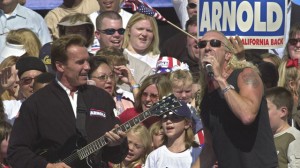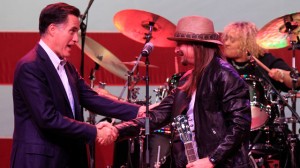Recent public protests by musicians against candidates using their work might have some politicians treading more carefully when choosing music for their campaigns — or even their personal playlists.
Earlier this month, the band Silversun Pickups penned a cease-and-desist letter to Mitt Romney imploring that he stop using their 2009 song “Panic Switch” at events. In a news release, lead singer Brian Aubert said, “We don’t like people going behind our backs, using our music without asking, and we don’t like the Romney campaign.” Romney spokeswoman Andrea Saul said “Panic Switch” was “inadvertently played during the setup for one event before Romney arrived” under a blanket licensing agreement with music publishers, although that legal use is under dispute.

Snyder (right) apparently was alright with Republican gubernatorial candidate Arnold Schwarzenegger, left, performing "We Ain't Going to Take it Anymore," during a campaign rally held at the Capitol in Sacramento, Calif., in 2003. (AP Photo/Rich Pedroncelli)
But musician, activist and recent Moyers & Company guest Tom Morello drew his line of disapproval not at a campaign using his tunes to fire up a rally but at a candidate who merely says he’s a fan of his music.
Morello’s ’90s-era rock band Rage Against the Machine is a favorite of congressman and vice presidential candidate Paul Ryan. In a fleeting detail in an April New York Times profile of Ryan that also noted his connection to the Oscar Meyer “Weinermobile” and love of catching catfish bare-handed, the congressman is depicted as he “strolls the halls of Capitol Hill with the anarchist band Rage Against the Machine pounding through his earbuds.”
Once Ryan was named as Mitt Romney’s running mate, his enjoyment of Rage Against the Machine was mentioned more often, prompting a response from Morello in Rolling Stone. Morello found Ryan’s fanship “amusing, because he’s the embodiment of the machine that our music has been raging against for two decades.” He continued:
“Don’t mistake me, I clearly see that Ryan has a whole lotta ‘rage’ in him: A rage against women, a rage against immigrants, a rage against workers, a rage against gays, a rage against the poor, a rage against the environment. Basically the only thing he’s not raging against is the privileged elite he’s groveling in front of for campaign contributions.”
Morello wrote that Ryan “can like whatever bands he wants, but his guiding vision of shifting revenue more radically to the one percent is antithetical to the message of Rage.”
All of which raises a question: In a world in which songs are reappropriated all the time to sell things like computers, sneakers, and car insurance, is it odd that the same people who sing, “This land is your land, this land is my land,” may also say, “This song is my song, it can’t be your song”?
To be fair to Republican campaign strategists, song selection for rallies must be challenging. Were they to stick to songs by artists who are fans of their party, the field of material available to them would be narrow indeed: country music (a rich trove of material, but not beloved by the entire electorate) plus a handful of rock acts including right-of-center Kid Rock and outspoken right-winger Ted Nugent.

Republican presidential candidate, former Massachusetts Gov. Mitt Romney, meets with Kid Rock after addressing supporters at the Royal Oak Music Theatre in Royal Oak, Mich., Monday, Feb. 27, 2012. (AP Photo/Carlos Osorio)
But these artists’ complaints aren’t grounded in legalities — rather, they fall into the murkier realm of public perception.
This is not entirely unrelated to the law: trademark cases often turn on public perception — consumers may infer endorsement, or be confused by the association of one image or product with another. As shown by this week’s Apple–Samsung court decision — where a jury found that Samsung stole Apple patents and associated its products with visual elements that make the iPhone a coveted gadget — issues of public perception can have billion-dollar consequences.
So it’s understandable that musicians in the public eye would be so protective of the public’s perception of them. Perhaps Somali-born rapper K’Naan explained it best when he told The New York Times earlier this year about his own run-in with the U.S. political process. The Romney campaign’s use of his song “Wavin’ Flag” at rallies led fans to accuse him of “selling out”:
“I got a flood of Twitter messages from people who assumed that it was all true, that I was now a supporter of Mitt Romney’s campaign… I’m for immigrants, I’m for poor people, and they don’t seem to be what he’s endorsing. My song being his victory song didn’t seem quite right.”
He asked the Romney campaign to stop playing his song.
What do you think? Perhaps modern political songs should come with a message similar to the cautions now standard on alcohol advertisements: Please enjoy this music responsibly.

